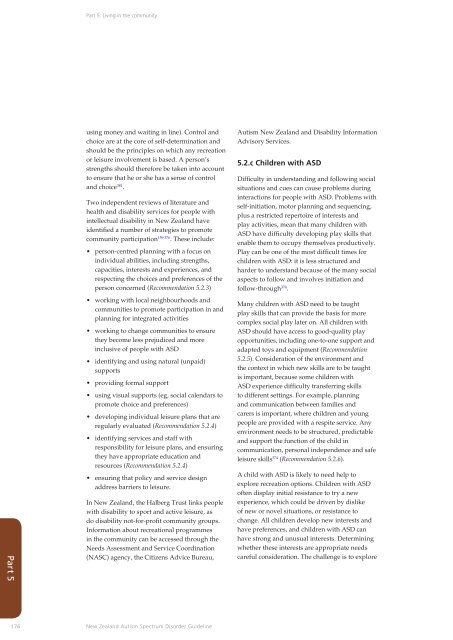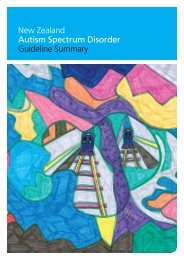New Zealand Autism Spectrum Disorder Guideline - Ministry of Health
New Zealand Autism Spectrum Disorder Guideline - Ministry of Health
New Zealand Autism Spectrum Disorder Guideline - Ministry of Health
Create successful ePaper yourself
Turn your PDF publications into a flip-book with our unique Google optimized e-Paper software.
Part 5: Living in the community<br />
Part 5<br />
using money and waiting in line). Control and<br />
choice are at the core <strong>of</strong> self-determination and<br />
should be the principles on which any recreation<br />
or leisure involvement is based. A person’s<br />
strengths should therefore be taken into account<br />
to ensure that he or she has a sense <strong>of</strong> control<br />
and choice 381 .<br />
Two independent reviews <strong>of</strong> literature and<br />
health and disability services for people with<br />
intellectual disability in <strong>New</strong> <strong>Zealand</strong> have<br />
identified a number <strong>of</strong> strategies to promote<br />
community participation 159 376 . These include:<br />
• person-centred planning with a focus on<br />
individual abilities, including strengths,<br />
capacities, interests and experiences, and<br />
respecting the choices and preferences <strong>of</strong> the<br />
person concerned (Recommendation 5.2.3)<br />
• working with local neighbourhoods and<br />
communities to promote participation in and<br />
planning for integrated activities<br />
• working to change communities to ensure<br />
they become less prejudiced and more<br />
inclusive <strong>of</strong> people with ASD<br />
• identifying and using natural (unpaid)<br />
supports<br />
• providing formal support<br />
• using visual supports (eg, social calendars to<br />
promote choice and preferences)<br />
• developing individual leisure plans that are<br />
regularly evaluated (Recommendation 5.2.4)<br />
• identifying services and staff with<br />
responsibility for leisure plans, and ensuring<br />
they have appropriate education and<br />
resources (Recommendation 5.2.4)<br />
• ensuring that policy and service design<br />
address barriers to leisure.<br />
In <strong>New</strong> <strong>Zealand</strong>, the Halberg Trust links people<br />
with disability to sport and active leisure, as<br />
do disability not-for-pr<strong>of</strong>it community groups.<br />
Information about recreational programmes<br />
in the community can be accessed through the<br />
Needs Assessment and Service Coordination<br />
(NASC) agency, the Citizens Advice Bureau,<br />
<strong>Autism</strong> <strong>New</strong> <strong>Zealand</strong> and Disability Information<br />
Advisory Services.<br />
5.2.c Children with ASD<br />
Difficulty in understanding and following social<br />
situations and cues can cause problems during<br />
interactions for people with ASD. Problems with<br />
self-initiation, motor planning and sequencing,<br />
plus a restricted repertoire <strong>of</strong> interests and<br />
play activities, mean that many children with<br />
ASD have difficulty developing play skills that<br />
enable them to occupy themselves productively.<br />
Play can be one <strong>of</strong> the most difficult times for<br />
children with ASD: it is less structured and<br />
harder to understand because <strong>of</strong> the many social<br />
aspects to follow and involves initiation and<br />
follow-through 374 .<br />
Many children with ASD need to be taught<br />
play skills that can provide the basis for more<br />
complex social play later on. All children with<br />
ASD should have access to good-quality play<br />
opportunities, including one-to-one support and<br />
adapted toys and equipment (Recommendation<br />
5.2.5). Consideration <strong>of</strong> the environment and<br />
the context in which new skills are to be taught<br />
is important, because some children with<br />
ASD experience difficulty transferring skills<br />
to different settings. For example, planning<br />
and communication between families and<br />
carers is important, where children and young<br />
people are provided with a respite service. Any<br />
environment needs to be structured, predictable<br />
and support the function <strong>of</strong> the child in<br />
communication, personal independence and safe<br />
leisure skills 374 (Recommendation 5.2.6).<br />
A child with ASD is likely to need help to<br />
explore recreation options. Children with ASD<br />
<strong>of</strong>ten display initial resistance to try a new<br />
experience, which could be driven by dislike<br />
<strong>of</strong> new or novel situations, or resistance to<br />
change. All children develop new interests and<br />
have preferences, and children with ASD can<br />
have strong and unusual interests. Determining<br />
whether these interests are appropriate needs<br />
careful consideration. The challenge is to explore<br />
176<br />
<strong>New</strong> <strong>Zealand</strong> <strong>Autism</strong> <strong>Spectrum</strong> <strong>Disorder</strong> <strong>Guideline</strong>











